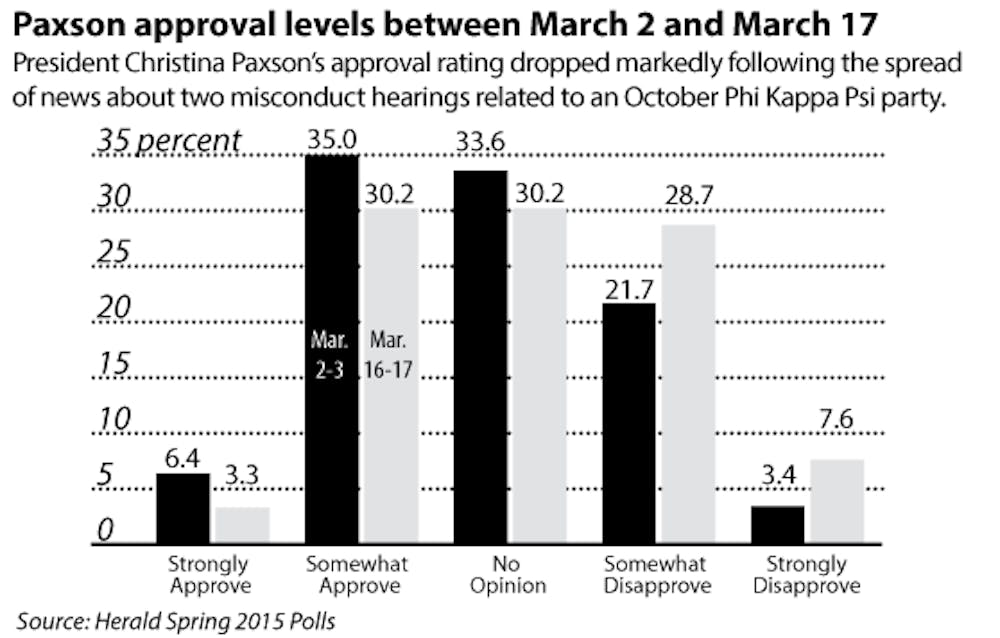A Herald poll of undergraduates conducted March 16-17 found that more than two-thirds of students disapprove of the University’s decision to cancel a hearing for a student accused of serving a drink with GHB at an October Phi Kappa Psi party. In addition, over 60 percent of respondents disapproved of the reasoning behind a student conduct board’s finding a student not responsible for sexually assaulting one of the women who reported being drugged.
The Herald reported the hearing cancellation and sexual misconduct decision March 4 and March 6, respectively. Earlier that week, a different Herald poll of undergraduates found that about 41 percent of students approved of President Christina Paxson’s P’19 job performance.
But two weeks later, after the news of the hearing’s cancellation and the conduct board decision had become public knowledge and about 400 students had protested those events, a second poll revealed that just under 34 percent approve of Paxson, and the rate of disapproval jumped from 25 percent to 36.
The first poll, conducted March 2-3, showed that students are divided on University sanctions imposed on Phi Psi for holding the October party, which administrators decided fostered an “unsafe environment” because alcohol was served to minors. Students are also split on the appropriateness of the less severe sanctions against Sigma Chi, which was found responsible for creating an environment in which a female student was touched without consent as she left a crowded basement at an unregistered party at the fraternity. In both cases, less than 10 percent of students indicated they thought the sanctions were too lenient.
Just over 50 percent of students disapprove of the interim ban on large-scale events with alcohol service at Greek and program houses that was implemented this semester.
Students involved in Greek life were significantly more likely than their non-Greek counterparts to disapprove of the interim ban and to judge the sanctions against Phi Psi and Sigma as too harsh. The percentage of Greeks strongly disapproving of the alcohol ban — 50 — is more than triple that of non-Greeks.
The first poll also addressed a number of topics unrelated to the October Phi Psi party and University measures to curtail sexual assault, including the campus political climate and students’ comfort voicing their political views.
While the vast majority of students identified as either somewhat or very liberal about social issues, fewer identified as fiscally liberal. In addition, several groups stood out as being more fiscally conservative than the general student body, including members of Greek organizations, athletes and male students.
Most students were either very or somewhat comfortable expressing their political views on campus, though students’ comfort sharing their views had a significant positive correlation with liberal social and fiscal views.
White students were more likely than non-white students to say they were very comfortable expressing their political views on campus.
The poll also asked students about feelings of inadequacy relative to other students. Over 40 percent of undergraduates indicated that they do not feel inadequate. First-generation, Hispanic and female students, as well as underclassmen, were more likely than their counterparts to indicate feeling inadequate about their academic ability — the most common perceived inadequacy among the answer choices.
A majority of respondents reported having interacted with graduate students in some capacity, and most have had positive experiences with them. The quality of interactions with graduate students correlated with class year, with upperclassmen giving graduate students higher marks. White students were also more likely to indicate positive experiences with graduate students.
The poll also found that the majority of students use their laptops for activities unrelated to class for 10 to 30 minutes in a typical 50-minute lecture in which laptop use is permitted.
The majority of students polled use ride-sharing apps such as Uber and Lyft at least once a month, with 11 percent indicating they use such apps multiple times per week.
Ride-sharing app use correlates significantly with being an international student. Over a quarter of undergraduates from abroad use these apps more than once a week.





